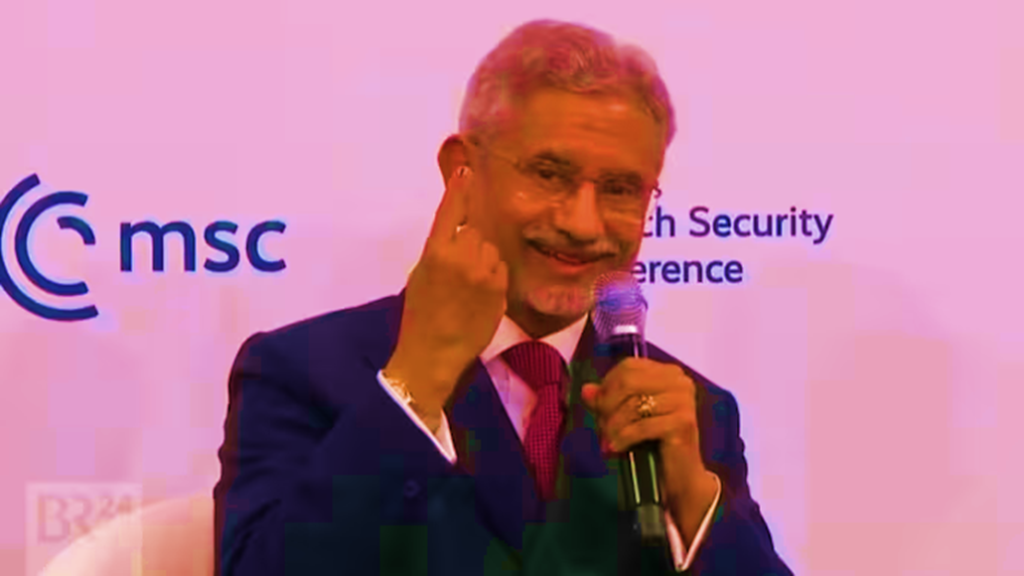Jaishankar presented his view while taking part in a panel discussion on the topic ‘Live to Vote Another Day: Fortifying Democratic Resilience’ alongside Norway’s Prime Minister Jonas Gahr Store, US Senator Elissa Slotkin and Warsaw Mayor Rafal Trzaskowsk. On a question about his views on Western democracy, Jaishankar said, “Well, before I do that, I appeared to be an optimist in what is relatively a pessimistic panel, if not room. I will begin by sticking up my finger and don’t take it badly, it is the index finger.
S Jaishankar Shows Inked Finger After US Senator’s Remark
Why In News
- External affairs minister S Jaishankar differed from the Western view that democracy is in trouble globally at the Munich Security Conference 2025 and highlighted India’s democracy.
What All Happened
- Jaishankar presented his view while taking part in a panel discussion on the topic ‘Live to Vote Another Day: Fortifying Democratic Resilience’ alongside Norway’s Prime Minister Jonas Gahr Store, US Senator Elissa Slotkin and Warsaw Mayor Rafal Trzaskowsk.
- On a question about his views on Western democracy, Jaishankar said, “Well, before I do that, I appeared to be an optimist in what is relatively a pessimistic panel, if not room. I will begin by sticking up my finger and don’t take it badly, it is the index finger. This, the mark you see on my nail, is a mark of a person who has just voted. We just had an election in my state just over. Last year, we had a national election.”
- Jaishankar highlighted how around two-thirds of the eligible voters cast their votes in India’s elections, adding that of the electorate of around 900 million, 700 million voted during the national elections. “We count the votes in a single day,” he said.
‘For Us Democracy Is Actually Delivered’
- He justified his differing view on democracy being in trouble on a global scale and said, “Nobody disputes the (election) result after it’s announced and by the way, from the time we started voting in the modern era, 20 per cent of people more vote today than they did decades ago.”
- “So, the first message is that somehow democracy is in trouble globally, worldwide, I am sorry, I have to differ with it. I mean, right now, we are living well. We are voting well. We are optimistic about the direction of our democracy and for us democracy is actually delivered,” Jaishankar added.
- He also responded to US Senator Elissa Slotkin’s statement that “democracy doesn’t put food on the table”. Jaishankar said, “Actually, in my part of the world, it does. Today, because we are a democratic, we give nutrition support, and food to 800 million people and for whom that is a matter of how healthy they are and how full their stomachs are.
- So the point I want to make is look different parts of the world are going through different conversations. Please do not assume that this a kind of universal phenomenon, it is not.” He noted that democracy might be working well in some parts and not so well in others, urging people to have “honest conversations about why it is not”.
- But, Jaishankar said, “I would argue that as to an extent as someone dispassionately viewing it, which was your question, there are some problems, a lot of it is a accumulated problem of the model of globalisation that we have followed for the last 25-30 years.”
- EAM noted that after independence, India chose a democratic model as the nation had a fundamentally consultative pluralistic society. There was a time when the West treated democracy as a Western characteristic, he said, many nations of the Global South are likely to relate more to India’s experience as transposable to their societies than to those of others.
- Jaishankar highlighted that India has remained true to its democratic model despite the challenges it has faced. He urged the West to embrace successful models outside of its region if it wants democracy to triumph.
- The 61st Munich Security Conference, which is being held in Germany’s Munich, began on February 14 and will conclude on February 16. The conference aims at offering an unparalleled platform for high-level debates on key foreign and security policies and challenges of time.













